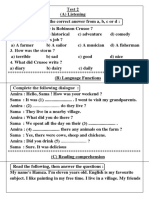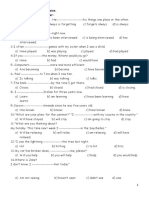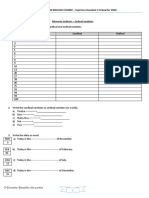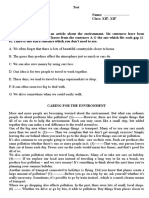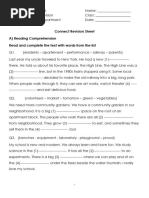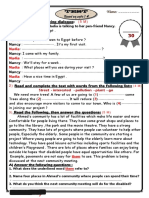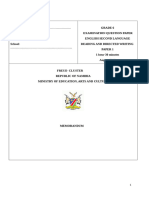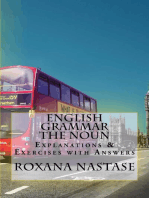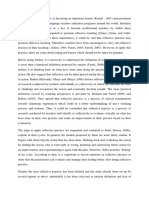Passive Voice Worksheet
Passive Voice Worksheet
Uploaded by
Napoleon Novillero CostalesCopyright:
Available Formats
Passive Voice Worksheet
Passive Voice Worksheet
Uploaded by
Napoleon Novillero CostalesOriginal Description:
Copyright
Available Formats
Share this document
Did you find this document useful?
Is this content inappropriate?
Copyright:
Available Formats
Passive Voice Worksheet
Passive Voice Worksheet
Uploaded by
Napoleon Novillero CostalesCopyright:
Available Formats
Complete the following sentences using appropriate passive voice forms of the verbs given in brackets.
Click here for a printer-friendly version of this passive voice worksheet
1. I ----------------------------- by his attitude. (shock – use past tense)
2. All the trouble ----------------------------- by that little girl. (cause – use past tense)
3. The positive hydrogen atoms ---------------------------------- to the negative oxygen atoms. (attract – use
present tense)
4. We -------------------------------- a collection of old manuscripts. (show – use past tense)
5. I think your ankle ---------------------------------- (break – use present tense)
6. His business ---------------------------------- to be in trouble. (say – use present tense)
7. English -------------------------------- in most parts of the world. (speak – use present tense)
8. I -------------------------------- in the lesson. (interest – use present tense)
9. I ------------------------------, but I went anyway. (use negative form of invite)
10. You --------------------------------- when the time comes. (tell – use future tense)
Answers
1. I was shocked by his attitude.
2. All the trouble was caused by that little girl.
3. The positive hydrogen atoms are attracted to the negative oxygen atoms.
4. We were shown a collection of old manuscripts.
5. I think your ankle is broken. OR I think your ankle has been broken.
6. His business is said to be in trouble.
7. English is spoken in most parts of the world.
8. I am interested in the lesson.
9. I wasn’t invited but I went anyway.
10. You will be told when the time comes.
Phrasal verbs
Each sentence given below contains a phrasal verb part of which is missing. Find the missing part and
complete the sentence.
1. These are important instructions for you. Take them ---------------------------
a) away b) down c) out
Your entry --------------------------------
2. It was so hot that I had to take my shirt -----------------------------
a) off b) away c) out
3. It is a serious problem. We must talk it ------------------------- like adults.
a) out b) over c) away
Your entry ------------------------------
4. We do not throw ------------------------------ anything useful.
a) out b) away c) off
Your entry ------------------------------
5. He tried ------------------------------ ten shirts before buying one.
a) out b) on c) away
Your entry -----------------------------
6. That music is driving me crazy. Please turn it -----------------------------
a) down b) out c) up
Your entry -----------------------------
7. His loan application was turned -------------------------- by the bank.
a) out b) down c) up
Your entry -----------------------------
8. Her arrogant behavior really turned me ---------------------------
a) off b) down c) out
Your entry -----------------------------
9. Turn ------------------------- the lights. I want to sleep.
a) off b) on c) down
Your entry -----------------------------
10. We have used -------------------------- all the milk.
a) up b) out c) on
Your entry ----------------------------
Answers
1. These are important instructions for you. Take them down.
2. It was so hot that I had to take my shirt of.
3. It is a serious problem. We must talk it over like adults.
4. We do not throw away anything useful.
5. He tried on ten shirts before buying one.
6. That music is driving me crazy. Please turn it down.
7. His loan application was turned down by the bank.
8. Her arrogant behavior really turned me of.
9. Turn of the lights. I want to sleep.
10. We have used up all the milk.
Separable phrasal verbs
The two parts of a separable phrasal verb can be separated. That means the
preposition in a separable phrasal verb can go before or after the object.
Complete the following sentences.
1. The terrorists blew ------------------------- the bridge.
a) away b) up c) of
2. Why do you always have to bring ------------------------- this topic?
a) of b) away c) up
3. He was brought ------------------------- by his uncle.
a) up b) of c) away
4. The meeting has been called --------------------------
a) of b) away c) on
5. Do this homework -------------------------
a) on b) over c) away
6. She filled ------------------------ the bucket with water.
a) out b) up c) over
7. Give me my money --------------------------
a) again b) back c) out
8. She handed --------------------------- her assignment and left the room.
a) in b) up c) on
9. Before you sign important papers, you must look them ------------------------
a) over b) away c) in
10. She spoke in such a low voice that we couldn’t make ---------------------------
what she was saying.
a) up b) out c) of
11. Pick ------------------------ the adjectives from the group of words given below.
a) out b) away c) up
12. We asked the manager to put ---------------------------- the meeting.
a) of b) away c) up
13. The firemen put -------------------------- the fire before it could cause any
damage.
a) out b) up c) away
14. Take ----------------------- what I say.
a) down b) out c) of
15. He took his shoes ---------------------------- and went to bed.
a) away b) of c) down
16. That’s such a good opportunity. Don’t just throw it -----------------------
a) of b) away c) out
17. He turned the music ---------------------------- so that he wouldn’t disturb the old
woman downstairs.
a) down b) up c) out
18. Turn ------------------------- the lights and fans when you do not use them.
a) of b) down c) on
Answers
1. Blew up (= exploded)
2. Bring up (= mention a topic)
3. Brought up (= raised)
4. Called of (= cancelled)
5. Do this homework over. (do over = repeat a job)
6. Filled up (= filled to capacity)
7. Give me my money back.
8. Handed in (hand in = submit something)
9. Look over (= examine)
10. Make out (= understand, hear)
11. Pick out (= choose)
12. Put of (= postpone)
13. Put out (= extinguish)
14. Take down (= make a written note)
15. Took of (= remove clothing)
16. Throw away (= discard)
17. Turn down (= lower volume)
18. Turn of (= switch of)
Inseparable phrasal verbs
The two parts of an inseparable phrasal verb cannot be separated.
Complete the following sentences.
1. I called ----------------------- an old friend of mine yesterday.
a) on b) in c) off
2. I am yet to get -------------------------- my broken heart.
a) off b) over c) out
3. We might go ------------------------ most of our coal reserves in a decade or so.
a) through b) over c) after
4. Who will look -------------------------- my dogs while I am gone?
a) out b) after c) into
5. I ran ------------------------- an old friend yesterday.
a) across b) over c) in
6. James ran ------------------------ his ex-girlfriend in the hallway.
a) into b) over c) out
7. My son takes ------------------------- his Dad.
a) after b) away c) out
8. The teacher asked the students to go ----------------------- the lessons before the
exam.
a) over b) on c) after
9. The police should look ---------------------- the motive behind the murder.
a) into b) at c) on
Answers
1. Call on (= visit)
2. Get over (= recover from sickness or disappointment)
3. Go through (= use up, consume)
4. Look after (= take care of)
5. Ran across (run across = find by chance)
6. Ran into (= met)
7. Takes after (= resemble)
8. Go over (= review)
9. Look into (= examine)
Complete the given passage
Complete the given passage.
When the Spaniard answered he ------------- (tell) me that their life -----------------
(be) so difficult that they ----------------- (will) do anything to escape. I -----------------
(suggest) that he should return to the mainland with Friday and ---------------
(discuss) the matter with his fellow countrymen. If they ---------------- (be) willing to
come to the island they -------------------- (can) return with him in the large canoe.
The Spaniard ------------------ (thank) me for my offer, but ----------------- (ask)
whether we ---------------- (have) at present enough food upon the island to feed
his companions as well as ourselves. This -------------- (be) a problem that I
------------- (have) not thought of, and I could see that we would need to grow far
more grain if we --------------- (be) to have so many people upon the island.
Answers
When the Spaniard answered he told me that their life was so difficult that
they would do anything to escape. I suggested that he should return to the
mainland with Friday and discussed the matter with his fellow countrymen. If
they were willing to come to the island they could return with him in the large
canoe.
The Spaniard thanked me for my offer, but asked whether we had at present
enough food upon the island to feed his companions as well as ourselves.
Thiswas a problem that I had not thought of, and I could see that we would
need to grow far more grain if we were to have so many people upon the island.
English Vocabulary
Synonyms
Synonyms are words of the same grammatical class (nouns, verbs, adjectives, etc.)
that have similar meaning. No word means exactly the same as any other word
and, therefore, there are no exact synonyms in English.
Certain words may convey the same general notion, e.g. slay, kill, murder, execute
and slaughter. Though they are used in different senses and in different contexts,
they may be treated as synonyms. Read the examples given below.
He was slain on the battlefield.
He was killed in action.
The robbers killed him and looted his property.
He was murdered in cold blood.
The criminal was executed.
The sheep were all slaughtered.
A list of synonyms is given below. No such list, of course, can be comprehensive.
Students may refer to Rogert’s Thesaurus for a further list of synonyms.
abbreviate – abridge, shorten
abstain – refrain
absurd – ridiculous
accomplish – achieve, perform
adversity – calamity, misfortune
adversary – opponent, enemy
alteration – change
amusement – diversion, recreation
anger – ire, wrath, rage
ascend – rise, soar, climb
authentic – genuine
autocrat – despot, tyrant
avaricious – greedy
aversion – dislike, antipathy
bias – prejudice
blend – mix, mingle
bondage – slavery
brave – courageous, bold
brief – concise, short
brisk – vigorous
cause – reason
check – restrain, stop, curb
command – order
compel – coerce, force
competition – rivalry
comprehend – understand, grasp
confer – grant
confess – admit
confuse – confound, perplex
conscious – aware
contemplate – meditate
contrary – opposite
couple – pair, brace
courteous – polite, civil
degeneration – deterioration
deplorable – regrettable, lamentable
despise – scorn, disdain
deny – refuse
dexterous – clever, skilful
dismal –gloomy
divide – part, separate
dizzy – giddy, dazed, unsteady
eccentric – peculiar, odd
efficient – able, competent
emphasise – stress
endure – suffer, tolerate
energy – force, vigour
enormous – huge, immense
error – mistake, blunder
eternal – timeless, perpetual
famous – celebrated, renowned
feeble – weak, infirm
felicity – happiness, bliss
ferocious – fierce, savage
flashy – showy, gaudy
foolish – silly, stupid
frailty – weakness, failing, foible
frank – candid, open
You might also like
- Statement AnalysisDocument27 pagesStatement Analysiswaymac00775% (4)
- Transitive or Intransitive Verb Worksheet 2Document3 pagesTransitive or Intransitive Verb Worksheet 2Napoleon Novillero Costales80% (10)
- Enterprise Data Management Data Governance PlanDocument36 pagesEnterprise Data Management Data Governance PlanSujin Prabhakar90% (10)
- Kaizen PrinciplesDocument42 pagesKaizen PrinciplesRaj100% (3)
- How Many Seeds in A Pumpkin - UpdatedDocument5 pagesHow Many Seeds in A Pumpkin - Updatedapi-386651232No ratings yet
- Pioneer B1+ Mod. 3Document12 pagesPioneer B1+ Mod. 3Zaki SaeedNo ratings yet
- تانية إعدادى امتحانات التيرم الأولDocument25 pagesتانية إعدادى امتحانات التيرم الأولRoza LeenNo ratings yet
- Worksheet Unit 2Document12 pagesWorksheet Unit 2Salim HudheifaNo ratings yet
- Unit 1Document5 pagesUnit 1selvamNo ratings yet
- 1st Term SheetsDocument27 pages1st Term SheetsMohamed ZakariaNo ratings yet
- Connect 5 November Revision2024-2025Document8 pagesConnect 5 November Revision2024-2025queenlolita88No ratings yet
- Unit 7 Test 2 GFGGHHDocument3 pagesUnit 7 Test 2 GFGGHHOthman Muhammad Farooq100% (1)
- Coordinating Conjunctions ExerciseDocument10 pagesCoordinating Conjunctions ExerciseRaniaGFNo ratings yet
- Docente Ben 1Document18 pagesDocente Ben 1Benedito LuisNo ratings yet
- Review 5.1Document6 pagesReview 5.1Tarik AattaNo ratings yet
- 9 TH English Mock TestDocument6 pages9 TH English Mock Testpramila monteiroNo ratings yet
- Test DocnDocument4 pagesTest DocnTamuna TsukhishviliNo ratings yet
- AECS Class 4 Model QP Eng-2Document10 pagesAECS Class 4 Model QP Eng-2spanja_barcNo ratings yet
- Eng Model Text 8Document2 pagesEng Model Text 8Kazi Tasfia RodoshiNo ratings yet
- Back To School After Winter BreakDocument7 pagesBack To School After Winter BreakCarlaNo ratings yet
- In The Name of God - Vision-2-Les2-N-2Document2 pagesIn The Name of God - Vision-2-Les2-N-2Mojtaba HekmatniaNo ratings yet
- Test 1 Model 9 English 3ac First TermDocument2 pagesTest 1 Model 9 English 3ac First Termaymanaymanch100No ratings yet
- 5XtXXA91yC 7391 Participles KeyDocument5 pages5XtXXA91yC 7391 Participles KeyTrương Thảo NhiNo ratings yet
- Final Revision (Answers)Document12 pagesFinal Revision (Answers)mohamed ElberryNo ratings yet
- G6 Connect RevisionDocument5 pagesG6 Connect RevisionnourfaroukNo ratings yet
- Revison Sheet Unit 1 Vocab and GrammarDocument4 pagesRevison Sheet Unit 1 Vocab and Grammarnermeenehab066No ratings yet
- 1 Technical English 1Document24 pages1 Technical English 1nirmalrajj50% (2)
- Year 10 Worksheet 2 PDFDocument19 pagesYear 10 Worksheet 2 PDFTavishi PragyaNo ratings yet
- امتحان علي أول 3 وحدات للصف الثالث الإعدادى الترم الأول 2022 مستر اسامة فتحى موقع دروس تعليمية اون لاينDocument2 pagesامتحان علي أول 3 وحدات للصف الثالث الإعدادى الترم الأول 2022 مستر اسامة فتحى موقع دروس تعليمية اون لاينMrs,Amina EnglishNo ratings yet
- Emsat Mock Exam: Section Questions MinutesDocument27 pagesEmsat Mock Exam: Section Questions MinutesAmor Chamekh67% (3)
- RigoDocument9 pagesRigomariana100% (3)
- 6 TestDocument20 pages6 Testboda1yasser2No ratings yet
- مراجعة كونكت بلس ٦ الترم الثاني - Excellence BookDocument23 pagesمراجعة كونكت بلس ٦ الترم الثاني - Excellence Bookmarwamohamed30mNo ratings yet
- Quiz TensesDocument11 pagesQuiz TensesIulia GramaNo ratings yet
- In The Name of God - Vision-2-Les2-N-1Document2 pagesIn The Name of God - Vision-2-Les2-N-1Mojtaba HekmatniaNo ratings yet
- Grammar مهمDocument57 pagesGrammar مهمabdulla07121No ratings yet
- Test Prep 3 Units 1-4 - Osama - Fathy - 221121 - 215331Document2 pagesTest Prep 3 Units 1-4 - Osama - Fathy - 221121 - 215331Amal SabetNo ratings yet
- Module 1 Prep One RevisionDocument9 pagesModule 1 Prep One RevisionNoor Wael And abdelRahman waelNo ratings yet
- TemplateDocument8 pagesTemplateliliana camacho ruiz 608No ratings yet
- Open Test 1 First Year Students Solved by Lubna MohammedDocument8 pagesOpen Test 1 First Year Students Solved by Lubna Mohammedlubna.mohammed.otakuNo ratings yet
- English Exams Part 02Document29 pagesEnglish Exams Part 02طوارئ وعمليات مطروحNo ratings yet
- Morse Code Work Sheet Word Document DownloadDocument4 pagesMorse Code Work Sheet Word Document DownloadOm BhartiNo ratings yet
- Revision - Ans - Key Worksheet 3-English-Grade 7 2022-23Document4 pagesRevision - Ans - Key Worksheet 3-English-Grade 7 2022-23Janani E .VNo ratings yet
- Comision Evaluadora 2023 EES23Document2 pagesComision Evaluadora 2023 EES23Cintia MendozaNo ratings yet
- Year 2language & Literacy Midterm RevisionDocument20 pagesYear 2language & Literacy Midterm RevisionArch Wassim MowafeyNo ratings yet
- 2019 April Question Paper English Grade 6 2Document14 pages2019 April Question Paper English Grade 6 2Betty SiambangoNo ratings yet
- Emsat Sample Test 1Document27 pagesEmsat Sample Test 1Robin HashemNo ratings yet
- Overcomer's Term English Studies RevisionDocument11 pagesOvercomer's Term English Studies Revisionadeponleanjola7No ratings yet
- SIMPLE PAST Offline TaskDocument1 pageSIMPLE PAST Offline TaskjoanaNo ratings yet
- OL Revision 1st SecDocument10 pagesOL Revision 1st SecfaroukmostafakhaledNo ratings yet
- 1) : Write The Correct Suffixes To The Given Adjectives:: Revision Unit 1.Document4 pages1) : Write The Correct Suffixes To The Given Adjectives:: Revision Unit 1.latefNo ratings yet
- Test InglesDocument6 pagesTest InglesKatherin BeraunNo ratings yet
- New Hello Third Year - Test On Units 1-6 Rev. 1 Mod. 2 - DDocument7 pagesNew Hello Third Year - Test On Units 1-6 Rev. 1 Mod. 2 - DessamwahbaNo ratings yet
- 6 FileDocument8 pages6 FilebetsyNo ratings yet
- Global Test Comprehension: Semester 1Document2 pagesGlobal Test Comprehension: Semester 1MohammedBaouaisseNo ratings yet
- EnglishDocument19 pagesEnglishlalita_831317182No ratings yet
- نماذج أولي وتانيه ثانوي اكتوبرDocument2 pagesنماذج أولي وتانيه ثانوي اكتوبرMaged GergesNo ratings yet
- 1-Dear Ann,: Name: - Class: 3èmeDocument3 pages1-Dear Ann,: Name: - Class: 3èmeJad ACHOURNo ratings yet
- Emsat Mock Exam 02: Section Questions MinutesDocument27 pagesEmsat Mock Exam 02: Section Questions MinutesAmor Chamekh100% (1)
- Pre-Int Eng 4 Final WorksheetDocument8 pagesPre-Int Eng 4 Final WorksheetergünNo ratings yet
- SUBJECT: Idioma Extrangero v2: Industrial EngineerDocument8 pagesSUBJECT: Idioma Extrangero v2: Industrial Engineeromar nuñezNo ratings yet
- Grade 9: Name: . Class: ..Document32 pagesGrade 9: Name: . Class: ..Nezar IsmailNo ratings yet
- Family and Friends: Welcome To Primary OneDocument35 pagesFamily and Friends: Welcome To Primary OneH_H2014No ratings yet
- Verbs & Prepositions ExerciseDocument3 pagesVerbs & Prepositions ExercisedeanNo ratings yet
- English Grammar - The Noun: Explanations & Exercises with AnswersFrom EverandEnglish Grammar - The Noun: Explanations & Exercises with AnswersNo ratings yet
- Review of Basic StatisticsDocument8 pagesReview of Basic StatisticsNapoleon Novillero CostalesNo ratings yet
- InternetDocument15 pagesInternetNapoleon Novillero CostalesNo ratings yet
- Grade 8 English MarangalDocument1 pageGrade 8 English MarangalNapoleon Novillero CostalesNo ratings yet
- Transitive Intransitive Verb WorksheetDocument2 pagesTransitive Intransitive Verb WorksheetNapoleon Novillero Costales100% (2)
- Learning App Planshowcase Nap - Inset2018Document1 pageLearning App Planshowcase Nap - Inset2018Napoleon Novillero CostalesNo ratings yet
- Vocabulary Exercises Using Context CluesDocument4 pagesVocabulary Exercises Using Context CluesNapoleon Novillero CostalesNo ratings yet
- Worksheet - Parts of A Computer PDFDocument4 pagesWorksheet - Parts of A Computer PDFNapoleon Novillero CostalesNo ratings yet
- Would Used To WorksheetDocument2 pagesWould Used To WorksheetNapoleon Novillero CostalesNo ratings yet
- For More English Grammar Worksheets VisitDocument2 pagesFor More English Grammar Worksheets VisitNapoleon Novillero CostalesNo ratings yet
- Words of Commitment RpmsDocument2 pagesWords of Commitment RpmsNapoleon Novillero CostalesNo ratings yet
- Childhood SweetheartDocument25 pagesChildhood SweetheartNapoleon Novillero CostalesNo ratings yet
- Nap Project My Basis1Document7 pagesNap Project My Basis1Napoleon Novillero CostalesNo ratings yet
- Jrich-R Technique and Improving Comprehension Abilities in English of The Grade 7 Students of Bannawag Integrated School (Proposal)Document11 pagesJrich-R Technique and Improving Comprehension Abilities in English of The Grade 7 Students of Bannawag Integrated School (Proposal)Napoleon Novillero CostalesNo ratings yet
- PROJECT NAP-AID For Campus Journalist.1Document8 pagesPROJECT NAP-AID For Campus Journalist.1Napoleon Novillero CostalesNo ratings yet
- Committee On Programs & Invitations: Committee in Hall Preparation & Stage DecorationsDocument3 pagesCommittee On Programs & Invitations: Committee in Hall Preparation & Stage DecorationsNapoleon Novillero CostalesNo ratings yet
- Deja VuDocument16 pagesDeja VuDiana CazacuNo ratings yet
- Formation of Ecological Communication Skills of Primary School StudentsDocument3 pagesFormation of Ecological Communication Skills of Primary School StudentsEditor IJTSRDNo ratings yet
- Misplaced Modifiers PDFDocument32 pagesMisplaced Modifiers PDFEyad WaelNo ratings yet
- Operations Research & Data Mining: Siggi OlafssonDocument50 pagesOperations Research & Data Mining: Siggi Olafssonepgp09No ratings yet
- Unit Plan - Cross Curricular Four Year Olds Sample Unit 1 PDFDocument9 pagesUnit Plan - Cross Curricular Four Year Olds Sample Unit 1 PDFKEENETH BALAYONNo ratings yet
- Module 7 Assessment in ArtDocument4 pagesModule 7 Assessment in ArtJamaica Lyra AndradeNo ratings yet
- Literature Review: This Information Is Taken From Kumar, Ranjit (1996) - Research Methodology: A Step-by-Step Guide ForDocument2 pagesLiterature Review: This Information Is Taken From Kumar, Ranjit (1996) - Research Methodology: A Step-by-Step Guide ForAmreen TajNo ratings yet
- Reflective Practice EssayDocument4 pagesReflective Practice EssayAl-vinna YolandaNo ratings yet
- Answers IbmDocument6 pagesAnswers IbmBeknur NarmaganbetNo ratings yet
- Chapter 6Document3 pagesChapter 6JackieNo ratings yet
- Passive Voice - TheoryDocument6 pagesPassive Voice - Theorynato.kharshiladze.1No ratings yet
- Academic Planning and Services Template - CollegeDocument3 pagesAcademic Planning and Services Template - Collegevanessa mae empasisNo ratings yet
- Lesson Plan of Operations of Radicals 2Document4 pagesLesson Plan of Operations of Radicals 2zaira acejoNo ratings yet
- Sep - 2023-2xjdDocument1 pageSep - 2023-2xjdnikhildsouza2575No ratings yet
- Jennifer Legan CV For Weebly Website PDFDocument1 pageJennifer Legan CV For Weebly Website PDFapi-257035564No ratings yet
- Part1 G22Document21 pagesPart1 G22Phan Thị Chi KimNo ratings yet
- Week 1Document967 pagesWeek 1Nurul Afiqah Awang100% (1)
- Criteria in Choosing Appropriate Assessment ToolsDocument19 pagesCriteria in Choosing Appropriate Assessment ToolsJohn PaloNo ratings yet
- Creative Writing Lesson PlanDocument7 pagesCreative Writing Lesson PlanRobin KeenanNo ratings yet
- Guidance-Ergonomics en PDFDocument28 pagesGuidance-Ergonomics en PDFsumit_waghmareNo ratings yet
- Philosophy SET A PDFDocument3 pagesPhilosophy SET A PDFReyster LimNo ratings yet
- CBSE Class 11 English Question Paper SA1 2011Document9 pagesCBSE Class 11 English Question Paper SA1 2011abhishekaks97No ratings yet
- Tugasan English ELTDocument11 pagesTugasan English ELTKhazanah BelantaraNo ratings yet
- App Development Planning Guide: Tobynoup9DcnsDocument6 pagesApp Development Planning Guide: Tobynoup9DcnsAvinashNo ratings yet
- Module 7Document6 pagesModule 7Emily V. OrtojanNo ratings yet
- Performance Evaluation by StudentDocument3 pagesPerformance Evaluation by StudentFarrell EgharNo ratings yet











